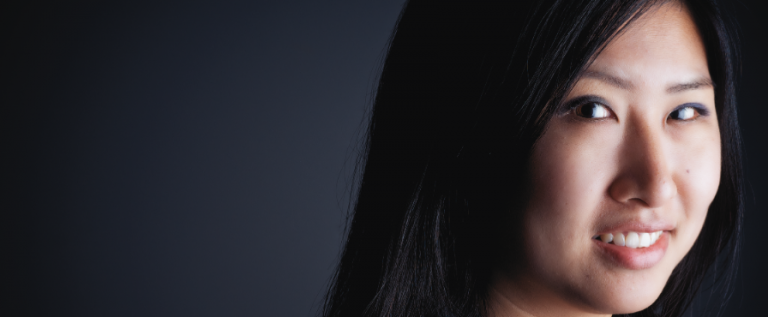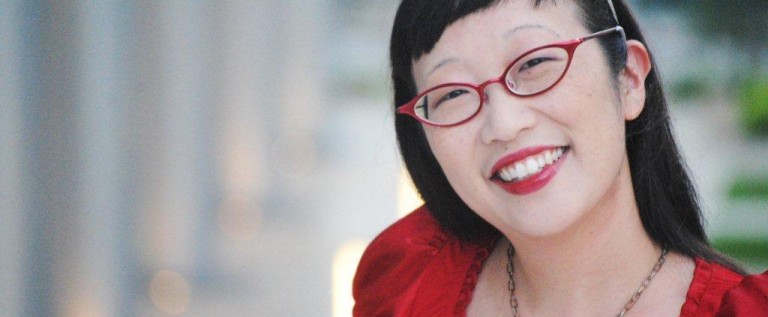Don’t Get Settled! Lessons from China & Another Huge Political Transition
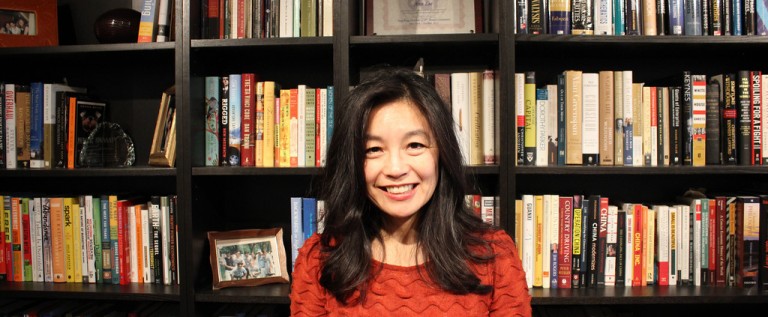
Looking back on the 2012 campaign, it is impossible to ignore the onslaught of messages calling it the most important election in generations. Indeed, it is often hard to step outside of the American media cocoon and see what else is happening around the world.
Approximately 48 hours after Americans went to the polls, China began the process of installing its new leadership for the next ten years. It is easy to dismiss the undemocratic process, which will carry on without the billions of dollars spent courting voters and flashy debates. However, this crucial ceremony within the Chinese Communist Party happened in the midst of the most political infighting in decades, as China solidifies its status as the world’s second largest economy during a time of global anxiety.
The title of a recent publication captures this important international relationship in both a timely and provocative manner: What the U.S. Can Learn From China: An Open-minded Guide To Treating Our Greatest Competitor As Our Greatest Teacher written by Ann Lee, who teaches economics and finance at New York University.
This richly relevant book is a rare treat, both for its keen cultural observations that illuminate the sophisticated economic and political analysis of US-China relations, and for its usefulness as a lens through which America can comprehend itself in a changing world.
America’s “Deep-Seated Insecurity”
“So many [Americans] have an emotional reaction just to the word ‘China’,” Lee says.The impassioned feedback she received can be categorized into two camps: internationalists who hail the book as insightful, balanced, and eye-opening; and nationalists who are adamant that the one-party state, ripe with corruption and oppression, and with the majority of people still living in poverty, has nothing to teach the world’s indisputable superpower.
It is by carefully disarming the ideological minefields that exist between the People’s Republic and the United States and parsing out practical, efficient and ingenious solutions to real-world problems that Lee’s book adds a real contribution to arguably most consequential bilateral relations in the world today.
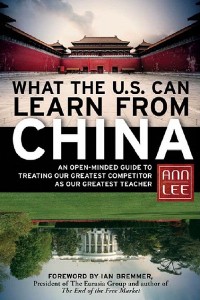 In the book, Lee chronicles the sweeping changes that China has undergone in the past decades to become the world’s most dynamic economy without glossing over its glaring and serious problems, and discusses the ways America can apply China’s best practices.
In the book, Lee chronicles the sweeping changes that China has undergone in the past decades to become the world’s most dynamic economy without glossing over its glaring and serious problems, and discusses the ways America can apply China’s best practices.
Most distinctively, Lee discusses how America can rediscover some of the values that it shares with Chinese civilization, namely work ethic, community and entrepreneurship. Moreover, how China selects leaders could be something America can emulate, given single-digit approval ratings of Congress. Lee points to practices such as civil service exams, the depth of leaders’ experiences, and the professionalization of officials, whereas in the US, civil servants have different qualifications than elected officials.
Not surprisingly, said suggestions are nowhere to be seen in mainstream media. “There’s some deep-seated insecurity in many Americans at this point in time, rooted in the economic downturn,” observed Lee. “I think their reaction to China stems from these insecurities.”
On her book and media tours, readers call in with very emotional remarks without considering the nuance in her ideas. It does not help that “getting tough” on China has become a common platform in stump speeches. While debates on monetary policy and intellectual property are important, candidates running for office often do not present the consequences of intensifying China-bashing with serious ramifications to diplomacy and global governance.
“It’s not necessarily pure rhetoric; there are many interest groups that have real reasons to try to emphasize new enemies to justify their budget increases, and a lot of folks who are influential hawks who advocate for American leadership in world affairs, code word for more military bases,” Lee says. “This strident message can really inflame people…it’s a lack of sensitivity to more international dialogue and understanding — respect for others’ worldviews and backgrounds.”
A Fresh Perspective from the Far East
At the same time, globally-minded publishers have seen an explosion in content about China, from The Economist’s section and blog dedicated to coverage of the Middle Kingdom, to the plethora of books and think tank reports on China’s economic and political footprint. Lee has been invited to present her book to venerable US institutions such as MIT, Google and the Treasury Department.
While the curiosity is expanding, the literature on China in the English-speaking world is, predictably, written from a Western perspective and vis-à-vis a US-centric lens.
This is what sets Lee’s book apart.
As a Chinese American, Lee’s perspective is uniquely authentic and balanced. She writes unapologetically in her optimism in American ideals, yet relentlessly warns that the premise of American supremacy is increasingly unrealistic and unworkable in a multipolar world.
“I can see that the new generation is changing attitudes,” Lee says, pointing to the willingness of young people being bridge-builders between Asia and America. “I’ve had a conversation with pioneering Asian American leaders who have respect and credibility to speak up more, but many of them don’t because there are too much at stake. Unable to advance a more constructive dialogue, that in turn hurt many Asian Americans as a result.”
Lee sees a shift from a posture that de-emphasizes Asian identity for the sake of blending in and achieving success in mainstream America, to a more assertive and proud Asian identity.
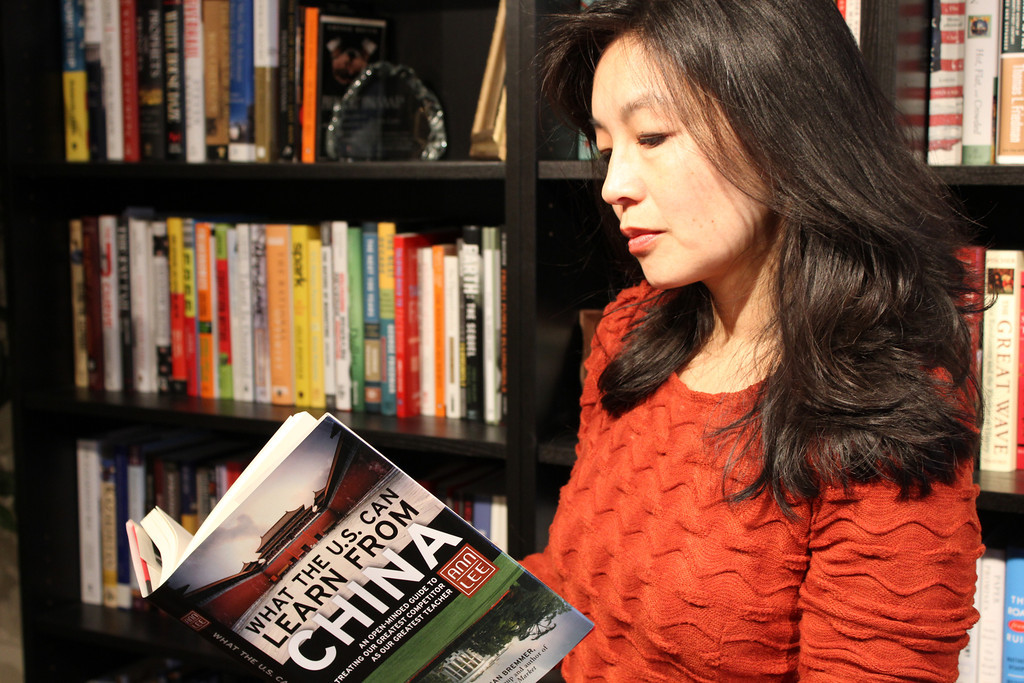
Photo by Jackie Ho for ALIST Magazine
“[Asians in America] have to embrace the fact that Asia has a rich history with many important civilizations in terms of contributing to inventions,” Lee asserts. “I think that gets blocked for whatever reason — they see the current paranoia [over the China threat] and they shrink from it instead of try to correct it.”
Lee learned these lessons first-hand from her personal journey.
“I came [to the US] when I was eight, so I’ve seen two very different cultures, spoke different languages,” Lee recalls. “I think it freed me from having my identity rooted in any particular nationality, it gave me more of an internationalist mentality, which is what we need to have in order find common ground in many areas.”
Co-Creating the World
Although Lee is receiving much critical acclaim from fellow academics and analysts on her book, she still sees an enormous challenge in changing the mindset of Americans about China.
“I think this is going to take time, culture doesn’t change overnight — but [having more Asian Americans] working in media would be one of the most effective and powerful way to try to move the needle,” says Lee.
Despite optimism about cross-national learning and bridge building, Lee is not naïve about the China’s shortcomings, from its corruption among local officials, to its people’s lack of civil and political rights, to the terrible environmental degradation. Still, Lee doesn’t see a traditional incompatibility between undemocratic government and creativity. Rather, she points to strategic investment by the centralized government in key industries that are boosting Chinese innovation, whether it’s measured by the number of patents that outpaces America’s, or the incredible feats in infrastructure.
On the innovation front, Lee highlights American developers who are emulating China. Lee describes a hotel in Brooklyn that was assembled via three chunks of building blocks and completed in three days, all stemming from watching a video of Chinese construction.
Overseas, China’s foreign policy is also garnering attention, especially its ability to win new friends abroad through business deals rather than through hard power.
“China came up with an ingenious quid pro quo: supply infrastructure to help other developing nations get on their feetwhile gaining access to the necessary raw materials. It’s a win-win situation,” said Lee.
At the same time, there are accusations of Chinese firms flooding local labor markets and supporting dictatorial leaders. Lee explains the frequent incompatibility between foreign workers and Chinese firms, and the inability of the Chinese to address grievances. “This is a weakness: they need to communicate much more. Not everyone comes and sees the world with the same lens.”
Even as China learns how to project itself abroad, Lee notes the demonstration of a different way of using foreign aid is possible in place of conditional attachments and top-down approaches. America and its Western counterparts have tremendous baggage from the legacy of colonialism, corporate exploitations, to modern military occupations. Thus, lessons from China present a historical opportunity to, in Lee’s words, “co-create the world.”
“It can be a future in which productive global cooperation can lead us to a new renaissance that will finally actualize the common desires for the common benefit of all people,” Lee writes.
Conversely, post-Mao China has also learned a great deal from America. US foreign direct investment has helped lubricate China’s astonishing modernization; American firms who spurred technological innovation and the symbiotic trade and monetary relationship has fueled American and Chinese manufacturing and development.
Lee ends her book on a note of faith in American institutions and ideals, from individual freedom and room for dissent, to the power of the American brand and diversity, to the checks and balances of the democratic system. Lee believes in America’s ability to self-govern and inspire hope — critical ingredients for China to chart a sustainable future. She writes,
“Americans should rise to the occasion and demand the best solutions in our own government…not just on Election Day, but every day.”
Follow Ann Lee’s commentaries on China at www.huffingtonpost.com/ann-lee or on Twitter (@annleesays).


